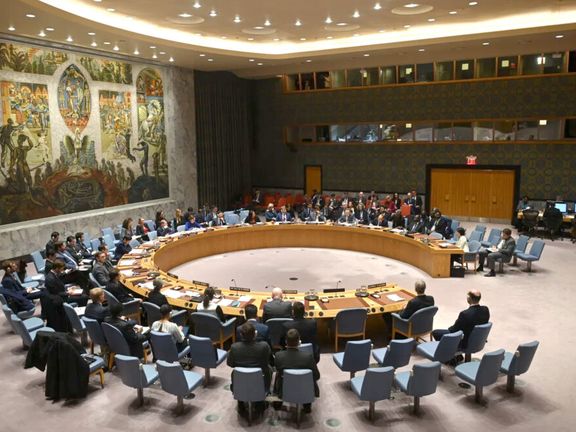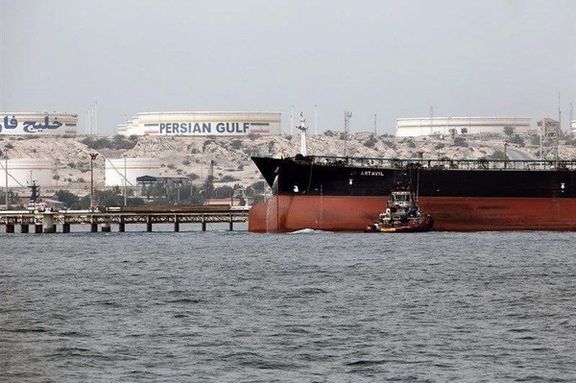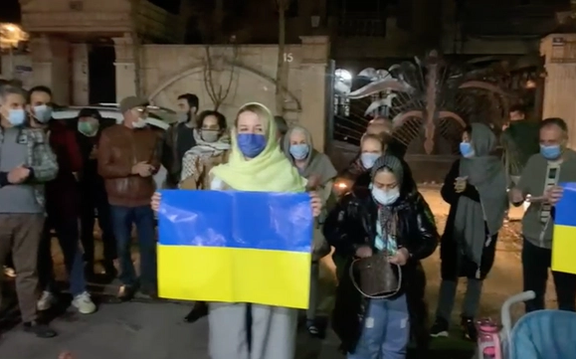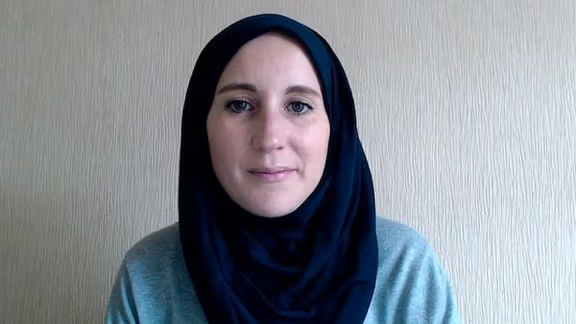At Least $12.5 Billion Worth Of Goods Are Smuggled In Iran

An anti-smuggling official in Iran has said the volume of smuggled goods is at least $12.5 billion and only one-third of the goods involved is discovered.

An anti-smuggling official in Iran has said the volume of smuggled goods is at least $12.5 billion and only one-third of the goods involved is discovered.
In a television show on Saturday, the head of Iran’s Headquarters for Combating Smuggling of Goods and Foreign Exchange, Ali Moayedi Khorramabadi, said the figure was over $25 billion about 10 years ago, accounting for almost one-third of the country's total trade.
He noted that due to political conditions and economic sanctions imposed on the Islamic Republic trade is not conducted in accordance with international laws, therefore a lot of commodities are smuggled in or out of the country.
He did not clarify whether the figure he mentioned includes goods that enter or exit the country with some sort of authorization by the government or the Revolutionary Guards or other organizations that help Iran circumvent United States’ sanctions.
Moayedi said that some of the smuggled commodities uncovered by authorities, such as flowers and pesticides, are destroyed but some of them such as home appliances and clothes are sold in the market.
He added foreign cars seized by the anti-trafficking organization are usually destroyed because no other country agrees to buy them due to a lack of proper registration and documents.
In January, the Washington Post uncovered a large diesel smuggling network, revealing the role of the Revolutionary Guard in the illicit trade.

The UN Security Council is due to vote Monday on a proposal by the United Arab Emirates to impose an arms embargo on Yemen's Houthis after the group claimed several drone and missile assaults on UAE.
The measure would expand a targeted United Nations arms embargo on several Houthi leaders to the whole group. The measure needs nine votes in favor and no vetoes by Russia, the United States, Britain, France or China.
A Saudi-led coalition, including the UAE, intervened in Yemen in 2015 after the Iran-aligned Houthis ousted the internationally recognized government from Sanaa. The Houthis say they are fighting a corrupt system and foreign aggression.
The coalition, the United States and UN sanctions monitors have accused Iran of supplying the Houthis with arms, which both Tehran and the group deny.
The war has killed tens of thousands of people and caused a humanitarian crisis, pushing Yemen to the brink of famine.
A year ago President Joe Biden's administration revoked a US designation of the Houthis as a terrorist organization over concerns that it would worsen Yemen's humanitarian crisis. Former President Donald Trump's administration had blacklisted the Houthis one day before Biden took office in January 2021.
The United Arab Emirates, Saudi Arabia and some American lawmakers are pressing the White House to return the Houthi movement to the US list of foreign terrorist groups over the recent Houthi attacks on the UAE and Saudi Arabia.
Reuters Report

After the Russian invasion of Ukraine began some analysts said oil can hit $130 a barrel and Iran's supplies will be needed, but prices pulled back on Friday.
Bloomberg quoted Rystad Energy Chief Executive Jarand Rystad as saying that the conflict could jeopardize one million barrels of crude that flows through Ukraine and the Black Sea, but “long-term disruptions could be far more significant.”
Adi Imsirovic, a Senior Research Fellow at the Oxford Institute for Energy Studies and former oil trader, said in a report published by Reuters that he is surprised the price has not jumped to $130 per barrel already. One reason could be that simmering tensions for the past months already contributed up to $10 a barrel to recent price increases.
But on Friday prices that had spiked above $100 a barrel retreated, signaling some reassurance that the West does not intent to sanction Russian energy supplies. Half of Russia’s crude oil exports, 2.3 million barrels a day go to the West.
Russia supplies ten percent of the world’s oil and is the second largest natural gas producer after the United States. Europe depends on Russia for close to 40 percent of its natural gas consumption.
President Joe Biden signaled on Thursday that he may release more supplies from strategic reserves in coordination with other countries, to address any shortfalls.
Analysts also raise the possibility of a nuclear agreement between Iran and the United States that could end Washington’s oil export sanctions on Tehran and help control prices. But Iran has little extra capacity, which is already not being utilized and exported. However, Imsirovic noted that Tehran has stockpiled 80 million barrels on tankers at sea that could be an immediate partial help.
An agreement between the US and Iran, however, remains uncertain as signals indicate Tehran insists on its tough conditions and US says “serious issues” remain unresolved. Statements by Iranian officials have not signaled of a softening of their position. Tehran still demands more US sanctions to be lifted and on Friday its nuclear chief said the country will continue to enrich uranium at 20 percent, even if sanctions are lifted.
It is not clear if Washington will make more concessions at this point, although the need to increase oil supplies looms large when the United States is confronting rising inflation.
Saudi Arabia and other Middle East producers could try to increase output too. Analysts are not sure whether low production by the Saudis is intentional or the result of technical limitations. The kingdom reduced output in 2020 when demand slumped with the pandemic. Some say that it is not easy to revive reduced production. But if Riyadh is holding back production that could also be related to Iran.
Saudi Arabia is not thrilled by the Biden Administration’s attempts to reach a nuclear deal with Iran, which many see as a weak arrangement that would not prevent Tehran from getting close to producing nuclear weapons. Many regional countries see the specter of a nuclear Iran as a serious threat to their security.
There is also the issue of Tehran’s support for Yemen’s Houthi rebels that fight a Saudi-led coalition that intervened in the country to support the internationally recognized government.

Videos on social media Saturday evening appeared to show police dispersing protesters chanting “Death to Putin” outside the Ukrainian embassy in Tehran.
After a summons to protest on social media, those assembled also chanted "Russian Embassy Is Den of Spies," "Death to Warmongers and Putin Supporters," "Putin Murders, the Stupid Ones Support,""Long Live Ukraine," and "Long Live Peace.”
Police began dispersing protesters a short while after they began to gather. A woman is seen in one of the videos telling the police, “We hate you.”
Videos on social media also showed police had cordoned off the Russian embassy in central Tehran to prevent protesters gathering there. Iran International has learned that additional security measures were put in place around the embassy as soon as calls for a protest went out on social media.
Iranian leaders, including President Ebrahim Raisi and Foreign Minister Hossein Amir-Abdollahian, have generally attributed the crisis in Ukraine to Nato and American “provocations”. They have called on Russia and Ukraine to call a ceasefire and find a diplomatic solution to end it.
Some Iranians and media outlets are unhappy with this. Reformist commentator Sadegh Zibakalam has tweeted “solidarity” with Ukraine and condemned what he called the Iranian government's support of Russia: "Contrary to the government's stance, the hearts of many Iranians are with the people of Ukraine and they condemn this aggression.”
The conservative Johmouri Eslami newspaper said Saturday that Russia had “clearly violated Ukraine's sovereignty” and that “military occupation of a country is against international regulations and ethical values.”
According to Modara news website, Mahmoud Abbaszadeh-Meshkini, spokesman of the parliament's National Security Committee, said Saturday that any recognized political party could submit an application to the interior ministry for a protest rally, including over Ukraine.
"Will you agree to permit a protest rally if a group of Iranians decide to stage a rally in front of the Russian Embassy to protest against the Russian invasion of Ukraine or it is [considered] against [Iran's] national interests?" journalist Mohammad Mohajeri asked in a tweet addressed to Interior Minister Ahmad VahidiSaturday.
Despite a constitutional right to freely protest, provided that participants do not carry arms and do not cause damage to "foundations of Islam", authorities regularly ignore applications for holding protest rallies.
Iran's state broadcaster (IRIB) controlled by Supreme Leader Ali Khamenei and media such as Fars and Tasnim news agencies affiliated with the Revolutionary Guard, have generally avoided the use of the word ‘attack’ and referred to "Russia's special military operations in eastern Ukraine."
This has riled some. Reza Ghobishavi, deputy editor of the conservative Asr-e Iran news website, criticized Thursday media outlets that had "sacrificed their credibility by siding with Russian President Vladimir Putin."
Former conservative deputy speaker of parliament Ali Motahari in a tweet Thursday compared IRIB to a “Russian colony.”

Iran has started importing diesel fuel again because the amount of its consumption has surpassed the production capacity of the country’s refineries.
An unnamed informed source told Mehr news agency on Saturday that the resumption of imports was not unexpected due to the imbalance between demand and supply.
The source added that Iran is importing diesel from countries to the north along the Caspian Sea, without elaborating on the exact supplier. Russia could be one possible source.
According to the source, gasoline imports will also start soon because consumption will exceed production at refineries.
Mehr says according to data by the National Iranian Oil Refining and Distribution Company (NIOPDC), the amount of gasoline production and demand will be equal in a couple of weeks.
NIOPDC head Keramat Veis-Karami recently said that the average daily gasoline consumption increased by about 15 percent this year compared with the figure in the previous year when there were frequent pandemic restrictions.
The report added that slowdown in the process of building refineries and the rise in consumption are the reasons for Iran to become a gasoline importer. The severe shortage of natural gas that has led to an increase in diesel consumption in power plants and industries can be another factor. American sanctions also play a role in slowing down refinery upkeep.
However, in January, the Washington Post uncovered a large diesel smuggling network, revealing the role of the Revolutionary Guard in the illicit trade.

An “Israeli” journalist “infiltrated” Iranian Supreme Leader Ali' Khamenei's website, according to a post by supporters of former president Mahmoud Ahmadinejad.
But Catherine Shakdam has been variously a contributor to Iranian official media, to United States-based outlets, and to Russian state-owned RT. She has been a French-born Jew, a UK resident, and a convert to Shiism.
In a post headlined "Writer of Ayatollah Khamenei's Website, An Israeli Infiltrator in Media Outlets of Supreme Leader's Office and IRGC [Revolutionary Guards],” the Sols Media Telegram channel claimed Shakdam, who had published articles on Khamenei's website and in major state-affiliated media outlets, was an Israeli “infiltrator."
In less than a day, the post was seen by nearly 10,000 Telegram users.
Ahmadinejad and his supporters are not allowed to publish their own newspapers or appear in state-controlled media. Instead, they use Telegram for 'revelations' and to promote his political views. In less than a day, the controversial post about ‘infiltration’ of Khamenei's office and state media has been seen by nearly 10,000 Telegram users.
The Telegram claim was based on a blog published over two months ago in The Times of Israel written by Shakdam, who traveled to Iran in 2017 to interview then presidential candidate Ebrahim Raisi. In the blog, Shakdam claimed she had pretended to be a Muslim, did not mention her earlier conversion, and gave no indication how she had written for Khamenei’s website (Khamenei.ir) or other Iranian outlets.
Sols Media reported that the articles Shakdam wrote for Khamenei's website had been completely removed but provided a link to an internet archive website where 18 can be accessed.
Over a period of several years, Iranian state-run media such as the English-language Press TV and the national broadcaster (IRIB) interviewed Shakdam, introduced as "political analyst and author based in London," while the Tasnim and Mehr news agencies published her articles.
Press TV has now removed programs featuring Shakdam from its archives, although her name still appears on its website in a few places. Many of her articles remain on Tasnim and Mehr websites. Tehran Times and some other Iranian publications have removed her articles too.
True motivations
"Keen to be let in to [Iran], I neither argued nor revealed my true motivations,” Shakdam wrote in The Times of Israel. “I realized pretty early on that if I was to witness first-hand what it is that the region [Islam] is really about, I’d better blend in and listen.”
Shakdam said it had been "fascinating” for her to find out in Iran “how Islam’s disdain for women" and "its communities’ propensity to disappear a wife to her husband’s identity" could absolutely “wash her” of her Jewish ancestry.
Despite her ‘discovery’ of this ‘disdain,’ Shakdam apparently earlier converted to Shia Islam and married a Yemeni Muslim. She has written for the state-owned Russian site, RT.com, where she argued in 2017 that “Saudi Arabia’s war crimes have become much too unpalatable for any responsible power to entertain.” RT describes her as a former consultant on Yemen for the United Nations Security Council.
The Huffingdon Post website, where in 2018 Shakdam wrote the US was becoming “a dictatorial police-state,” describes her as “the Executive Director of PASI (Prince Ali Seraj of Afghanistan Institute for Peace and Reconstruction) …[as well as] director and founder of Veritas-Consulting.”
Shakram claimed ‘free pass’
In the Times of Israel piece, Shakdam claimed she had been introduced to Raisi by a US-educated person whom she called "one of the main propagandists of the Islamic Revolution." Her patron's vote of confidence for her good morals, she wrote, was enough to secure her the “one interview” most westerners were denied.
She claimed that "a girl like me” had ended up where few people with Jewish ancestry were ever allowed to enter either because she had been lucky or as a "result of a hunger so fierce" in the Iranian media for "rallying western thinkers to Iran’s cause.”
"I nevertheless walked right into the belly of the Beast – invitation in hand, by the request of the very government whose motto calls for the death of all Jews and the annihilation of Israel," Shakdam wrote for the Times of Israel. She also boasted that her holding a French passport and former marriage to a Yemeni Muslim gave her "a free pass to many Islamic countries."
The is social footage of Shakdam speaking with enthusiasm of Shiism. She appeared in hijab in interviews with Iranian media but not in other photos, for The Times of Israel and for RT.She is the author of Arabia’s Rising - Under The Banner Of The First Imam.